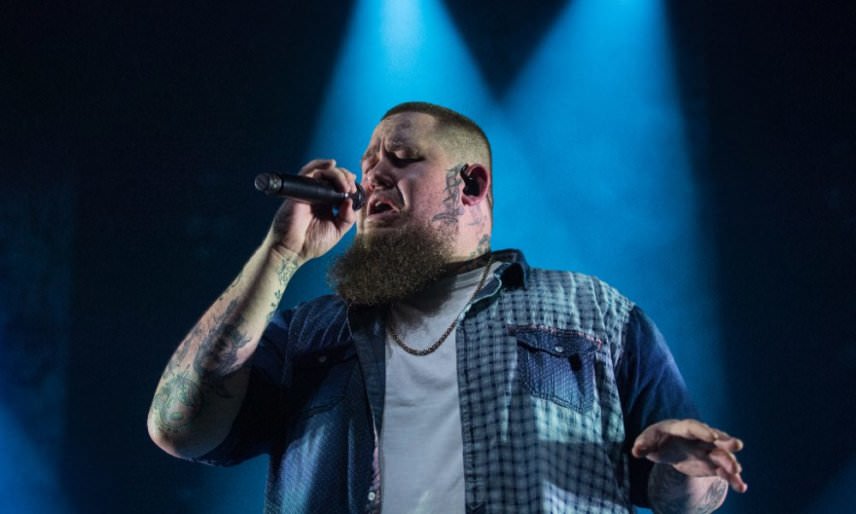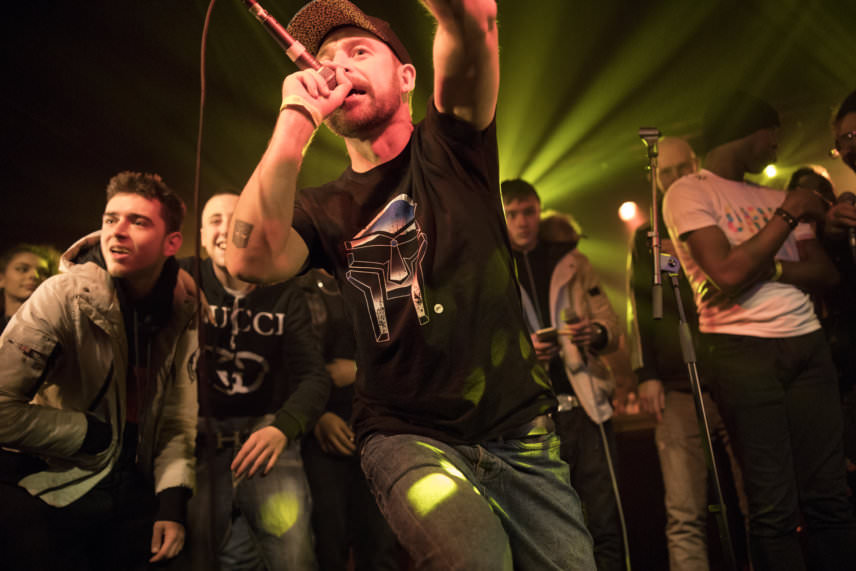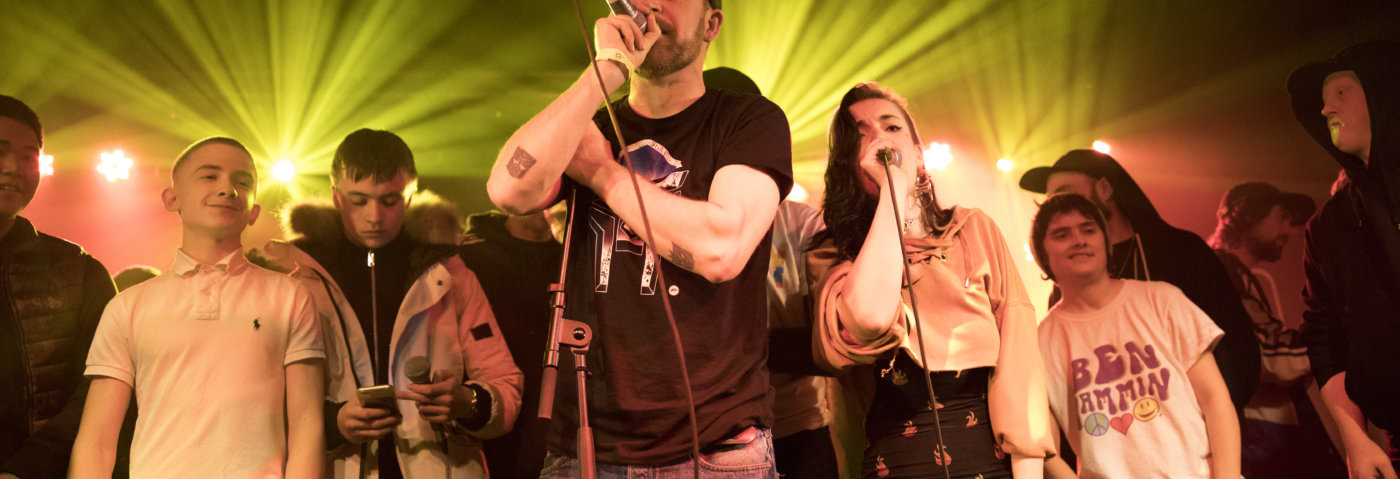AudioActive are a UK music charity who work with young people. They see music as “an end in itself as well as a tool for social change, education and personal development”. Engagement Manager and Music Practitioner Tom Hines tells us about working with Audio Active.
Name?
Tom Hines
Place of work?
AudioActive. AudioActive is a youth music organization based in Brighton working with young people across Sussex. We facilitate free open access music projects allowing any young people to experiment with music-making. We give them a voice and platform through lyric writing and performance. Alongside inclusive events and workshops, we also provide talent development opportunities. AudioActive also runs targeted sessions with some of the hardest to reach young people, partnering with other services and community organisations. A lot of our work operates out of our studio/rehearsal complex in Brighton called ‘Bottega Rooms’.
Job?
I’m the Engagement Manager and also an active practitioner – running rap sessions and music production workshops for young people. It’s an interesting mix as I’m the link between the office staff, the freelance practitioners, the wider music scene and the young people themselves. My job’s a bit of project management, a bit of creative stuff and an awful lot of dealing with the chaotic world of teenagers.
How long have you had the job?
I first started teaching for AudioActive sixteen years ago but I’ve been part of the office team for the past five years. It’s grown a lot over the years – especially since Rag ‘n’ Bone Man got behind us and became our Patron.

What does a typical day involve?
One of the best parts of the role at AudioActive is that there isn’t much semblance of normality. I do a lot of problem-solving, juggling tasks and thinking on my feet. When I’m office-based, part of my duties include creative stuff like graphic design/illustration and doing the social media channels and content. There are a lot of meetings every day but I kind of enjoy networking and liaising with professionals. These can include social workers, the council, teachers, artists, labels etc. My speciality comes out in the pastoral side. Supporting young people in crisis or helping them with talent development and opportunities. Other days are more of your usual bog-standard admin/fundraising/reporting or whatever the priority is at that point. Cool opportunities often drop into our laps with little notice and it makes the job pretty hectic most of the time.
In the evening I teach rap – mainly at our Brighton studios ‘Bottega Rooms’ but sometimes out and about running cyphers in the parks or organising and hosting events.
I try and be down at our ‘Bottega Rooms’ studios as often as I can and be right in the middle of music-making and rehearsals but I usually end up fixing computers and hunting for lost kit.

Highs of the job?
The best part is the longevity and getting to watch young people who came to our workshops as teenage novices go on to achieve very big things. It’s pretty special. Some of our alumni have had chart success or are well known in their respective scenes. Some now work for us as teachers. It’s great when someone disappears for a while then remerges with a cool project and starts getting a lot of attention. The last two ‘BBC Sound of the year’ artists have had affiliations with projects we’ve put on.
Teaching and rapping alongside the latest generation keeps me sharp too. I have to be fairly up to date with current music trends to keep relevant and be able to hold my own with the young blood. I love watching kids reluctantly approach the mic at events then utterly steal the show. It’s great to enjoy young artists successes vicariously. I’ve had a lot of friends and peers offering to come down and “teach a masterclass or something” and then watching them slowly realise they’re perhaps not one of the best in the room once they’re there.
I think that’s what’s unique about our approach is we don’t always ‘teach’ but instead facilitate cool collaborative spaces where different generations from diverse background are all in the room to do the same thing, no matter their circumstances. At its best, you’ll have homeless young people, young offenders or kids in the care system rubbing shoulders with university students, accomplished musicians and established acts. There’s a lot of good role modelling and learning by osmosis which goes on.
Lows of the job?
People often comment on how “rewarding” the job must be but honestly for every success story there’s another equally tragic tale. I’ve been to far too many funerals in the last few years. Working with young people is not for the faint-hearted either, especially in the current climate. We’ve witnessed a lot of exploitation, substance abuse, knife-related crime and suicides recently. It takes its toll but can be a motivation to try and be as supportive as possible to those in challenging circumstances. Despite the negatives, we’ve had some real success stories in getting people off a certain path. That approach is needed now more than ever. Our one-to-one mentoring program is especially effective in supporting young people that would be considered ‘at risk’.
How did you get the job?
When AudioActive needed a rap tutor to accompany the DJ workshops that were going on in 2004 my name kept getting put forward. I’d taken a few younger rappers under my wing in my early 20’s when I moved to Brighton and I guess they’d heard about that.
In those days I was heavily involved in the rap open mics and the general hip hop scene in Brighton so I already knew a lot of the kids who used to try and sneak in or come to rap outside. We had a chat about what sort of stuff I could do and I ended up running a weekly session on-and-off for about a decade. When a management role in the office came up, it was the right time to throw my hat in the ring. I’d been teaching art in a behavioural school and working in children’s homes at the time and was burning out a bit and needed a change.
What did you do before this job?
Before I joined the management team the rap workshops with AudioActive were always my work on the side. Before that my day jobs were all over the place: cooking, running a restaurant, managing an off-license, selling trainers, some freelance illustration jobs. Then I got into youth work and the care sector more heavily and started working with hard-to-reach youths as a career path.
How can we get your job?
Sometimes it feels a bit like I have fallen into a dream job, in the sense that I get to rap and do art bits, piss about online and hang about studios and venues with fellow musicians for work. On reflection, it’s a culmination of lots of little life events adding up to make the relevant experience.
Some of my most despised jobs have ticked the right boxes in terms of management procedure, relevant policy procedures or legislation know-how. Working in children’s homes was not an enjoyable period of employment. However, the understanding of complex needs, dealing with challenging behaviour and the personal patience developed over that time are invaluable attributes.
To work with young people in any capacity I’d recommend volunteering in the first instance. People who’ve helped us out in the past have managed to get their foot in the door for other youth sector roles down the line. Some have even got regular work with us. It’s also worth testing the water to see if working with children and teenagers is right for you. It’s a nice idea, but for some the reality can be a bit more challenging than expected.
Who are the people who’ve had the biggest influence on your career and why?
My Mum was a detached youth worker so it was always something I understood and respected but it wasn’t really an ambition. I thought she just hung around in parks trying to get kids to stop smoking weed. Once I hit 15 I started to hear stories about the lengths she’d gone to help people and the reputation she’d earned. It was humbling and very inspiring. Her name got me out of being beaten up a few times too.
At around the same time on a musical level (around the mid 90’s) I started to have chance encounters with UK Hip Hop acts who were active at the time. Acts like New Flesh 4 Old, Credit to The Nation and The Brotherhood. I grew up in York so meeting these people was a big deal at the time. Seeing British hip hop crews doing their thing in a UK style was hugely influential. I started rapping (especially freestyling) but never took it seriously until I went to university in Cornwall. Co-incidentally a lot of hip-hop heads moved to the same tiny coastal town at the same time I did. Each brought loads of artist mates who’d come and visit and play at nights we were running. Meeting people like Jehst, Task Force, Rodney P & Skitz just before the UKHH scene really took off was hugely inspirational.
Moving to Brighton I visited a rap open mic night and it was one of the first times I’d seen more than a few people who were capable of freestyling well in one place. Freestyle was the part of rapping that always my thing. Years later I ended up taking over the night and ran it for many, many years. So all the hundreds of MC’s who graced the stage of Slip Jam are very important to me (but too many to namecheck). If I had to mention one person from that era it’d be my good friend Dr Syntax. We did a lot of shows together and taught each other a lot.
As far as young people that have been involved in AudioActive go, I’ve always been in awe of Jordan Stephens (of Rizzle Kicks). He used to come to the rap workshops as a youngster. He constantly surprises me with the things he achieves and the wide range mad creative projects he gets up to after pop stardom. I remember when he casually told me he’d got a part in ‘Star Wars Rogue One’. He’s a great example of good things happening to positive people.
Have you ever thought about going it alone?
I’m pretty loyal to the AudioActive after being so involved for so long. At the end of the day my heart is in grass roots community work – so, if the organization moved too far from my ideals, I wouldn’t necessarily follow but I’ll be here as long as I can still do the work that’s important to me.
What’s the one bit of advice you wish you’d known at the beginning of your career?
I think it’d be something about not needing to specialise too much too early on. I used to struggle a lot about whether I wanted to be a visual artist or a musician. I found it really hard to commit or label myself. The truth is I didn’t need to. When I left home, I was at the crossroads of which route to pursue. I chose to quit rapping and move to the middle of nowhere, thinking I’d paint all day. I ended up meeting more musicians and influential hip hop heads there than I would have if I tried to seek my fortune moving to London.
It’s especially true these days – you almost need to be a bit of a polymath to succeed. It’s important for vocalists and instrumentalists to know their way around the studio and DAW’s but equally vital to have a bit of marketing/business sense. If you can do your own art and make your own videos even better. Any skill you can diversify and make money from when the art isn’t working is prudent to be aware of.
What’s the biggest mistake you’ve made in your career to date?
I think just not taking anything very seriously at a younger age. I’ve been in the studios when some seminal UK hip Hop albums were being made but I wasn’t particularly bothered about recording at the time or didn’t go back to finish stuff off properly.
There are certain classic album’s I hear and I’m reminded I was invited to feature but was too hungover to record or had other places to be.
How would you like to see your industry develop over the next five years?
I still find it strange that formal music education looks down on urban and electronic genres. Schools are woefully behind in many cases when it comes to technology and current trends. There’s still a bit of elitism around genre and music-making processes from other art institutions. This is despite the reality of the creativity, influence and monetary successes exhibited by some young artists.
Currently the best routes into industry exist within mainstream and formal training. Many exceptionally creative & talented young people have been let down by or simply did not fit into the education system. Lots have had very negative experiences of formal education and are therefore unlikely to progress further through it. As a result, many promising young creative minds plateau in their late teens and never fulfil their potential.
We’re committed to championing these ‘square pegs’ and to remedy a current gap in the UK’s talent development infrastructure. AudioActive aim to establish the UK’s first Centre of Excellence for the talent development of diverse & marginalised artists. We are currently looking to develop relationships with potential future stakeholders and supporters of our work as we move towards this exciting step-change for the organisation, our sector and the communities we work with.
Main photo by Time For Heros Photography.
